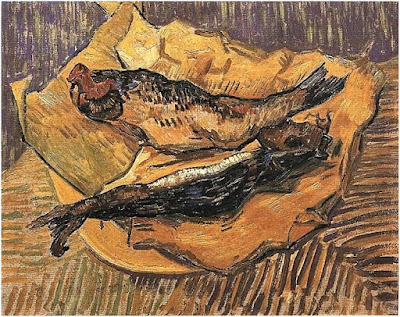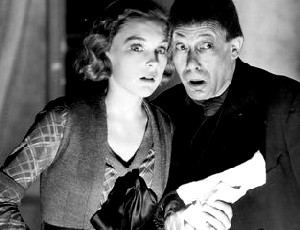"Quite often. I'm afraid the entertainment I derive from them is not quite what the author intends."
--Death Came Softly (1943), ECR Lorac (Carol Rivett)
Pastoral mysteries in the detective fiction oeuvre of Christopher Bush comprise a comparatively small amount of his overall output (among his first ten novels, The Plumley Inheritance, Murder at Fenwold, aka The Death of Cosmo Revere, and The Case of the Unfortunate Village stand out in this respect), yet they became an increasingly noteworthy strain in the work of Bush's contemporary and Detection Club colleague Carol Rivett, who published detective fiction as ECR Lorac and Carol Carnac.
| side view of Kingston Lacey and garden, Dorset |
Rivett, on the other hand, was a third generation Londoner on both sides of her family (though the families originally came from, on her father's side, Suffolk, and, on her mother's side, Wiltshire).
Death Came Softly was published in 1943, several years after Rivett had left London with the dark advent of the German air bombing campaign known as the Blitz, an event that made life in London precarious indeed. In 1940 Rivett dwelt at the village of Thurlestone in Devon, the lovely county in which Death Came Softly is set.
In the novel wealthy widow Eve Merrion--no relation, one supposes, to Miles Burton's gentleman amateur sleuth Desmond Merrion, though I think Merrion was a family name of the author's-- is desirous of getting away from wartime London, and she comes to Devon hunting for houses.
 |
| murder mars wartime life at the country mansion |
Eve's heart alights on Valehead House, "a long Italianate building, so stylised and symmetrical, set among the rich Devonshire woodland," though it is much too big for her, from a simply practical standpoint. Yet she buys it, just like that! (Must be nice.) I visualize a bit of Kingston Lacey, though that great house is located in Dorset.
Happily the previous tenants of the mansion were wealthy Americans who, in the aqueous manner of their breed, installed a bevy of bathrooms. "English people never squander money on anything so superbly luxurious," pronounces Eve, whose creator, Carol Rivett, was the great-granddaughter of the first superintendent of the Marylebone Baths, where much of Marylebone kept clean (or relatively so).
 |
| garden at Kingston Lacey (house shown above) |
Also on hand at Valehead House when murder inevitably strikes are Eve's and Emmeline's father, the distinguished anthropology professor Dr. Crewdon; the professor's private secretary, Roland Keston; swarthy American explorer Bruce Rhodian; fair poet David Lockersley; and Eve's live-in servant couple, Mr. and Mrs. Carter.
Even more than Valehead House itself, Eve is enraptured by the gardens which surround it: the author, whose sister Maude Howson had an advanced degree in botany, lavishes, like Agatha Christie in Hallowe'en Party (1969), long descriptive passages on the horticultural wonders of the estate, which comes complete with an inhabitable "hermit's cave."
 |
| the cave where Professor Crewdon meets his demise |
Professor Crewdon enjoys sleeping in this cave (you tell me), and it is in this cave that he is found dead one morning, from the fatal effects of carbon monoxide exposure. Was he accidentally killed by the coal in the brazier that lit the cave at night? The Yard's Chief Inspector Macdonald, Lorac's redoubtable series detective, thinks not, and we know he can't be wrong!
 |
| hermit's cave, Dale Abbey, Derbyshire |
The presence of Rhodian and Lockersley feels somewhat artificial, as if imposed by the need of the author to expand the suspect list during wartime, when the presence of military eligible male characters had to be rationalized somehow (and perhaps one of these men actually is guilty--I'm not saying!). The murder is gadgety without having the genius of that genius death-dealer John Street or some of the other "Humdrums." Nor is the local color as strong as it could be.
Still, the book does offer an honest-to-goodness formal problem puzzle, and there's always something to be said for that. Also, as is often the case with Carol Rivett, the political and social commentary is interesting and definitely not the hidebound Toryish stuff traditionally associated with British mystery at this time.
| Eve and Emmeline, after a fashion |
It's hard to imagine Agatha Christie laying down her cards quite so forthrightly, unless it was a ploy to pull a last-minute super-surprise switcheroo!
Eve is the widow of Axel Merrion, a metallurgist who was "a man of great intellectual powers yet of marked humanity, interested in all that pertained to the advancement of human knowledge and well-being." His influence on Eve, too, as beneficent, to say the least:
Led by his wisdom, fired by his enthusiasm for all that was noblest in human thought, Eve Merrion had developed from a kindly, lighthearted girl into a mature woman of wide information and generous mind.
Emmeline's marriage to an Indian Army officer, on the other hand
had crystallized all that was conventional in her. "Empire, Prestige, Dignity"--these were Emmeline's values, described laughingly by Eve as "E.P.D." In the narrow sphere of army life and thought, Emmeline had grown into what her sister ruefully described as "a perfect lady, perfect within the limitations of social convention."
Rivett's cocking a snook at Empire is especially striking given the book's publication date of 1943, when British was fighting desperately to hang on to what was left of it.
Soulful and warmhearted Eve--"Beautiful she was not, smart [i.e., stylish--TPT] she was not, but she had some quality which was as lovable as the still evening light which irradiated the quiet air."--has tired of city life and wants to dwell in the country, an attitude that apparently reflected that of the author herself at this time. This exchange between Eve and her cook/housekeeper Mrs. Carter concerning the evening's dinner menu at Valehead House is telling:
 |
| gooseberry tart for recipe see thepassionfruits.com |
"Goodness, how lovely! Though I feel guilty over having so many good things. Isn't it glorious being here, Mrs. Carter? I can't bear to think of living in a town again, ever."
"There's certainly a lot to be said for the country these days, madam," replied Mrs. Carter, and her tone made Eve laugh.
"You're a real Londoner, aren't you?" she said as she turned away."
Eve's shallow and superficial sister Emmeline loves city life, however. Yet on returning to wartime London Emmeline was most disappointed to find that
Everything seemed to be a problem--food, service, even laundry, all those things which had been taken for granted so gaily in the old world, were now major problems, crises occurring afresh week after week.
When Emmeline suggests to Eve the county of Surrey as an alternative London getaway, Eve scoffs, lecturing Emmeline: "....Surrey is really a glorified suburb. It's all tacked on to London, a sort of dormitory and week-end resort for wealthy stock-brokers, rather than real country."
 |
| "I always says you can't beat a bloater for tea." "Bloaters on a piece of yellow paper" (1889) Vincent Van Gogh |
The good woman chattily confides to Emmeline:
"A bit on the 'igh side maybe, but I always says you can't beat a bloater for tea."
A classic collision of the classes in Golden Age British crime fiction this is, but the author's sympathies here lie not with the distressed gentlewoman, but with the cheerful char. And if you think it's only Tory mystery writers who in their fiction, at least, looked down on the haitch-dropping class, take a look at Socialist Margaret Cole's mysteries.
Speaking of left-wing ideology, another character, Chief Inspector Macdonald's journalist friend Peter Vernon, is spared a moment to praise the International Brigade ("Stout fellas," he avows.)
 |
| Camberwell House Asylum, now residential housing for the Camberwell School of Art --appropriately so, given Carol Rivett's love of art |
Beatrice is recorded as having died at the age of 75 on May 17, 1943, at Camberwell House, a private asylum. In Death Came Softly Rivett mentions the Camberwell district where the asylum was located when the servant Carter tells Macdonald that all of his and his wife's personal papers were stored in a room that was "Bombed flat. Lavender Terrace, Camberwell, Just wiped out it was, in November, 1940." During the Second World War a high explosive bomb landed on the grounds of Camberwell House.
Commenting on her death of her father, Professor Crewdon, after the case has been solved by the perspicacious Macdonald, Eve Merrion declares, "Now I feel I can put it it all behind me. I'm not going to sorrow over my father. He was happy, and he died happily, in his sleep, without knowing pain or fear."
Was this the author's attitude about the death of her mother? To be sure, Professor Crewdon died at his mental peak in a hermit's cave in rural Devonshire, Beatrice Rivett is a private asylum in London, presumable when suffering from dementia. But it seems more than a coincidence that Carol Rivett would have tackled this subject in her fiction the same year that her own mother died.
 |
| former gardens at Camberwell House |
The puzzle interest in not as strong in this novel as one finds in the best of the Humdrums's work (nor is the misdirection as ably handled as it is in Christie), but the characterization is not as strong as one finds with the "manners" Crime Queens (Dorothy L. Sayers, Ngaio Marsh, Margery Allingham).
Carol Rivett was a very prolific author, arguably too much so I think, in that some of her books are definitely weaker than others. Death Came Softly gets a middling mark from me, but, rest assured, the next book I review by her will be ranked higher.

In spite of the flaws in this, I'm still excited to see someone writing about Lorac -- she might be my new Unattainable GAD Fascination...
ReplyDeleteI had read most of the Loracs before I started my blog, but thought I would write a bit about her since a couple of her books are being published. She’s certainly a worthy candidate for revival, and some may well like this one more than I did. On rereading, I was most interested in the seeming links to her own life.
ReplyDeleteHaven't read this one yet. Even middling Lorac is entertaining to read, at least for me.
ReplyDeleteI think you can tell from the post I enjoyed a good bit of it; I have written a lot less about books I liked more! I suppose the novel may have been a victim of my high expectations for the author. But I can see a lot of people liking it without my reservations.
DeleteSorry to hear this one didn't work for you as well. Just reviewed a different Lorac novel on my blog today, which is also one of her rurally set mysteries. Looking forward to seeing which Lorac novel you comment on next, as she is not a writer I have enough of to form any set opinions yet.
ReplyDeleteIt's another in the rural cycle, something that interests me right now.
Delete